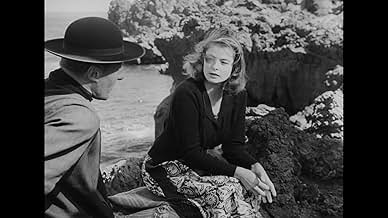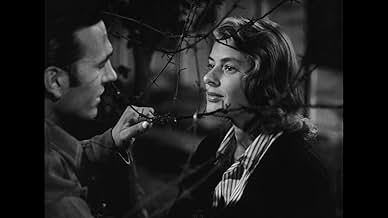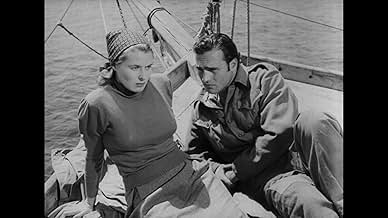VALUTAZIONE IMDb
7,2/10
8390
LA TUA VALUTAZIONE
Per rimanere in Italia Karin, profuga lituana, sposa una guardia del campo d'internamento, pescatore di Stromboli, ma è dura la vita da straniera sull'isola. Disperata, durante un'eruzione c... Leggi tuttoPer rimanere in Italia Karin, profuga lituana, sposa una guardia del campo d'internamento, pescatore di Stromboli, ma è dura la vita da straniera sull'isola. Disperata, durante un'eruzione cerca di andarsene.Per rimanere in Italia Karin, profuga lituana, sposa una guardia del campo d'internamento, pescatore di Stromboli, ma è dura la vita da straniera sull'isola. Disperata, durante un'eruzione cerca di andarsene.
- Premi
- 2 vittorie e 1 candidatura in totale
Gaetano Famularo
- Man with Guitar
- (non citato nei titoli originali)
Angelo Molino
- Child
- (non citato nei titoli originali)
Roberto Onorati
- Man
- (non citato nei titoli originali)
Recensione in evidenza
Other recent commentaries on this film call it a "masterpiece". I strongly disagree. When it opened the reviews were as bleak and indifferent to it as Karen (Ingrid Bergman) is to the island of Stromboli. No one considered it up to Rossellini's "Open City" or "Paisan" in terms of genuine artifice. It was termed bleak and undistinguished with a plodding script that could only be called simplistic in terms of dialogue.
Fine B&W cinematography of a desolate island and scenes of an actual volcano eruption are not enough to make a 107-minute movie tailored to demonstrate the neo-realism of Ingrid Bergman's acting now that she had shed her Hollywood glamour. Bergman is ill served by a poorly developed character and embarrassingly inept scenes between her and her Italian fisherman husband (Mario Vitale).
There is startling realism in the tuna fishing sequence and harsh realism in the desolate landscape and close-ups of island people, but Rossellini did not seem to have a well developed or finished script in mind when he began shooting what others have called a "masterpiece". There is no doubt that had he the advantage of a well structured and conceived screenplay he might have been effective in telling this kind of story. But with the camera lingering on an anguished Ingrid Bergman sobbing in scene after scene of emotional isolation, the viewer is left with the feeling that this is little more than a post-war documentary in search of a coherent plot.
The unresolved ending used in the U.S. print is not the original ending, by the way, and leaves the viewer with the feeling he has witnessed an unfinished screenplay. It is said that Rossellini began shooting without a complete script on a day to day basis that must have been a strain on Bergman. It shows when he spends an inordinate amount of time on a fishing sequence that has little to do with furthering the slight plot. Too bad he didn't start the project with a finished script and a firm focus for his content.
The background music is oddly silent during some of the most emotional moments and despite Italian chants of fishermen the soundtrack remains mostly barren of any interesting content.
Fine B&W cinematography of a desolate island and scenes of an actual volcano eruption are not enough to make a 107-minute movie tailored to demonstrate the neo-realism of Ingrid Bergman's acting now that she had shed her Hollywood glamour. Bergman is ill served by a poorly developed character and embarrassingly inept scenes between her and her Italian fisherman husband (Mario Vitale).
There is startling realism in the tuna fishing sequence and harsh realism in the desolate landscape and close-ups of island people, but Rossellini did not seem to have a well developed or finished script in mind when he began shooting what others have called a "masterpiece". There is no doubt that had he the advantage of a well structured and conceived screenplay he might have been effective in telling this kind of story. But with the camera lingering on an anguished Ingrid Bergman sobbing in scene after scene of emotional isolation, the viewer is left with the feeling that this is little more than a post-war documentary in search of a coherent plot.
The unresolved ending used in the U.S. print is not the original ending, by the way, and leaves the viewer with the feeling he has witnessed an unfinished screenplay. It is said that Rossellini began shooting without a complete script on a day to day basis that must have been a strain on Bergman. It shows when he spends an inordinate amount of time on a fishing sequence that has little to do with furthering the slight plot. Too bad he didn't start the project with a finished script and a firm focus for his content.
The background music is oddly silent during some of the most emotional moments and despite Italian chants of fishermen the soundtrack remains mostly barren of any interesting content.
Trama
Lo sapevi?
- QuizDuring production of this film, Ingrid Bergman entered into an extra-marital affair with Roberto Rossellini and became pregnant, the two eventually getting married and having three children. The resulting scandal in America effectively blacklisted her from the North American movie market and she was even condemned by politicians and religious figures. She was finally forgiven and welcomed back to America upon the success of Anastasia (1956), but her Hollywood career was temporarily ended by this movie.
- BlooperWhen the police officer is typing the report, he does not strike nearly enough keys to produce the amount of information shown on the paper.
- Curiosità sui creditiOpening credits: "I was found of them that sought me not; I was made manifest unto them that asked not after me." (New Testament, St. Paul's letter to the Romans, Chapter 10, Verse 20)
- Versioni alternativeSeveral running times exist. The main difference between the 81 min. US version and the 105 min. Italian version was in the ending, with religious themes cut out.
- ConnessioniEdited into Histoire(s) du cinéma: Une histoire seule (1989)
I più visti
Accedi per valutare e creare un elenco di titoli salvati per ottenere consigli personalizzati
- How long is Stromboli?Powered by Alexa
Dettagli
- Data di uscita
- Paesi di origine
- Lingue
- Celebre anche come
- Stromboli
- Luoghi delle riprese
- Aziende produttrici
- Vedi altri crediti dell’azienda su IMDbPro
Botteghino
- Budget
- 1.000.000 USD (previsto)
- Lordo in tutto il mondo
- 17.532 USD
- Tempo di esecuzione1 ora 47 minuti
- Colore
- Proporzioni
- 1.37 : 1
Contribuisci a questa pagina
Suggerisci una modifica o aggiungi i contenuti mancanti

Divario superiore
By what name was Stromboli (Terra di Dio) (1950) officially released in India in English?
Rispondi




















